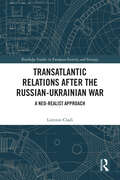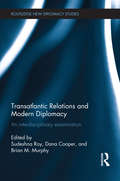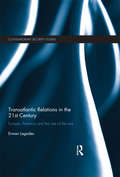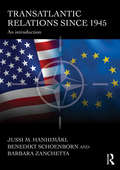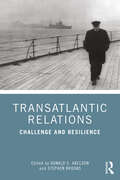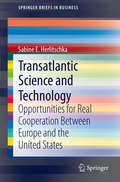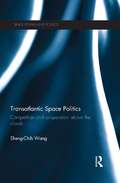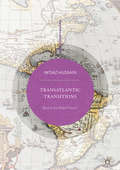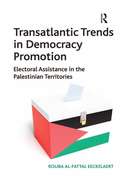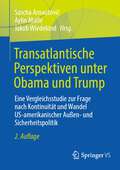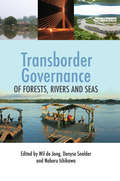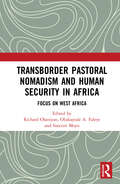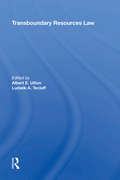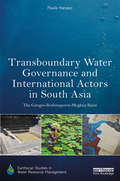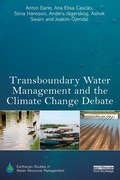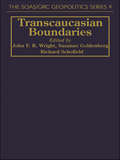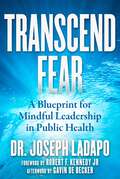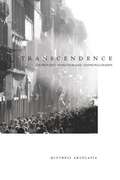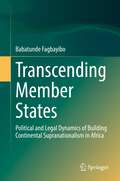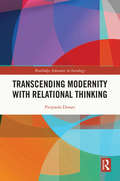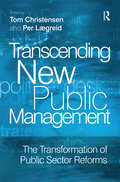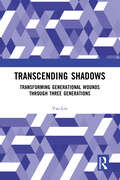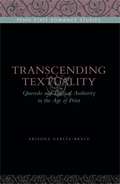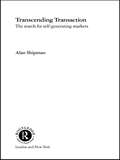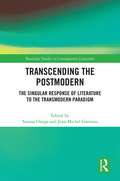- Table View
- List View
Transatlantic Relations after the Russian-Ukrainian War: A Neo-realist Approach (Routledge Studies in European Security and Strategy)
by Lorenzo CladiThis book provides a neorealist explanation of transatlantic relations and explores key issues at the forefront of the relationship between the US and its European allies in the context of the Russia-Ukraine war.Transatlantic relations, involving the relationship between the United States and its European counterparts, are an essential feature and a cornerstone of the foreign policy of many states. Whilst the transatlantic allies share a relationship that has been in place since 1945, the re-election of Donald J Trump as US President, the continuing war between Russia and Ukraine, and unsettled issues around European strategic autonomy all pose questions on the state of the partnership. This book utilises a neorealist theoretical framework to tackle these questions. It argues that transatlantic relations continue to prosper and European states remain dependent on the US for their security, which is made viable and necessary by means of dealing with collective threats to the security of transatlantic allies, of which the Russian invasion of Ukraine is the most obvious recent manifestation. The book also deals with other notable case studies of transatlantic relations, such as the French intervention in Mali and the US withdrawal from Afghanistan.This book will be of interest to students of European security, Foreign Policy, and International Relations.
Transatlantic Relations and Modern Diplomacy: An interdisciplinary examination (Routledge New Diplomacy Studies)
by Dana Cooper Sudeshna Roy Brian M. MurphyThis book explores the transatlantic relationship between the US and Europe from multiple perspectives and disciplines. Since the end of the Cold War, a multi-polar world has replaced the dual power economic and political stranglehold previously shared by the US and Russia. Amid the shift in power politics, the transatlantic partnership between the US and Europe has retained its importance in shaping the outcome of future global developments. With the rise of the US as a major world power and the tremendous economic growths witnessed by countries such as China, India and Brazil, the political power structures within and outside the transatlantic relations have gradually undergone shifts that are important to recognise, understand and critically assess on a consistent basis. Transatlantic Relations and Modern Diplomacy assesses the strengths and weaknesses of this enduring transatlantic relationship from multiple perspectives and disciplines at a time when the US and European countries are facing increasing economic pressures, significant political changes and substantial security concerns. Examining this relationship through a range of different lenses including historical, economic and cultural, this book highlights the importance of examining the transatlantic relationship from a variety of different contextual and historical perspectives in order to herald the future changes as informed global citizens. This book will be of interest to students of transatlantic studies, diplomacy, political science and IR in general.
Transatlantic Relations in the 21st Century: Europe, America and the Rise of the Rest (Contemporary Security Studies)
by Erwan LagadecThis book offers an overview of the interface between European integration, transatlantic relations, and the 'rise of the rest' in the early 21st century. The collapse of the Soviet bloc opened up an era in which the drivers and perceived benefits of the US alliance among European countries have become more variegated and shifting. The proposition that the US remains at once an 'indispensable' and 'intolerable' nation in Europe is a key concept in the alliance, as the US remains inextricably tied to the continent through economic, military and cultural links. This work examines this complex subject area from many angles, including an analysis of the historical and cultural contexts of America’s relations with Europe, as well as a discussion of the politics of transatlantic affairs which utilises evidence gleaned from a series of case-studies. In the concluding chapters, the author assesses the likelihood that the West can entrench its global dominance in the realms of "soft" and "hard" power, and by effecting a "controlled reform" that will see multilateral structures open up to emerging powers. This book will be of great interest to students of European Politics, EU integration, transatlantic relations, US foreign policy/diplomacy, International Security and IR in general.
Transatlantic Relations since 1945: An Introduction
by Barbara Zanchetta Jussi Hanhimaki Benedikt SchoenbornTransatlantic Relations Since 1945 offers a comprehensive account of transatlantic relations in the second half of the 20th century (extending to the present-day). The transatlantic relationship has been the bedrock of international relations since the end of World War II. This new textbook will focus on the period since the defeat of Nazi Germany, when the multitude of links between United States and Western Europe were created, extended, and multiplied. Written in an accessible style, it emphasizes transatlantic interactions, and avoids the temptation to focus on either U.S. ‘domination’ or European attempts to ‘resist’ an American effort to subjugate the old continent. That influence has travelled across the Atlantic in both directions is one of the starting points of this text. Structured chronologically, the book will be built around three key themes: Security: From the Cold War to the War on Terror; Economics: Integration and Competition; ‘Soft power’ and Transatlantic Relations. This book will be of great interest to students of transatlantic relations, NATO, US Foreign Policy, Cold War History, European History and IR/International history.
Transatlantic Relations: Challenge and Resilience
by Donald E. AbelsonThis book explains how and why the transatlantic relationship has remained resilient despite persistent differences in the preferences, approaches, and policies of key member states. It covers topics ranging from the history of transatlantic relations, North Atlantic Treaty Organization and security issues, trade, human rights, and the cultural sinews of the relationship, to the impacts of COVID-19, climate change, think tanks, the rise of populism, public opinion, and the triangular relationship between the United States (US), Europe, and China. The book also conceptualizes resilience as a quality arising from myriad forms of interdependence. This interdependence helps shed light on the Atlantic partnership’s capacity to withstand serious disagreements, such as those that occurred during the Reagan, George W. Bush, and Trump presidencies. With a principal focus on the US and Europe, the contributors to the volume also employ Canadian case studies to provide a unique and useful corrective. This book will interest all intermediate and senior undergraduate as well as graduate courses on relations between the US and Europe, American foreign policy, and European Union foreign policy. A specialist readership that includes academic and think tank researchers, policy practitioners, and opinion leaders will also benefit from this timely volume.
Transatlantic Science and Technology
by Sabine E. HerlitschkaMajor societal challenges of a global nature include climate change, efficient energy supply, environmental sustainability, and health care. Science & Technology Policy (S&T) policy is an essential contributor to dealing with these challenges; moreover, international cooperation and collaboration in S&T is vital to tackling these issues, since no single nation or even region is able to respond adequately by itself. Within this context, this book addresses recent developments in transatlantic S&T cooperation between the European Union and the United States. The EU-U.S. relationship dates back to the 1950s, with regular EU-U.S. Summits to assess and develop transatlantic cooperation. In the area of S&T, the EU and U.S. concluded an S&T Cooperation Agreement in 1998, renewed it in 2004, and extended it for another five years in July 2009. The research underlying this study is based on interviews with key stakeholders in the field, with an emphasis on: * potential new opportunities and new mechanisms for increased transatlantic EU - U.S. S&T cooperation under current conditions * examples of coordinated "science diplomacy" efforts * options for the development of effective joint efforts. While the project is focused on European-U.S. relationships, it also addresses issues of international S&T cooperation involving other regions, including Africa and Asia. The author highlights the urgency of S&T cooperation to address global issues, and the evolving roles of government, universities and research centers, and industry, in promoting successful strategies and programs.
Transatlantic Space Politics: Competition and Cooperation Above the Clouds (Space Power and Politics)
by Sheng-Chih WangThis book examines transatlantic politics through an analysis of 60 years of US-European strategic interaction in space. The significance of space politics for the study of transatlantic relations receives surprisingly little scholarly attention. As a theatre of interaction, transatlantic space politics reflects the vicissitudes of European and US power in the international system. An understanding of space politics is therefore vital in understanding the status and prospect of the transatlantic order. Using established IR theories, the author investigates transatlantic space politics and proposes a theoretical explanation, which is distinct from the conventional wisdom of the transatlantic security community. More specifically, he distinguishes between the constitutive and regulatory effects of the transatlantic security community, an approach rarely employed in other research in the field. Overall, this book suggests not only that the transatlantic institutional pillar requires repair, but also that the ideational factors need to be revitalised in order to consolidate the transatlantic alliance. This book will be of much interest to students of space power, transatlantic politics, strategic studies, foreign policy and IR/security studies in general.
Transatlantic Transitions: Back To The Global Future? (Global Political Transitions Ser.)
by Imtiaz HussainWith North Atlantic post-World War II transatlantic dynamics as the subject, this volume inquires if its theoretical tenets hold in other epochs and Atlantic arenas. Both case and comparative studies of such historical cases as the silver, slave, and commodity trades, and whether ideas, such as faith and democracy, have as much impact as these merchandise flows, simultaneously challenge and strengthen the transatlantic paradigm. They permit transatlantic relations to be stretched as far back as to the 8th Century, in turn exposing transatlantic flows hugging global threads, while revealing the strength and size of several unaccounted types of transatlantic transactions, such as the north-south varieties.
Transatlantic Trends in Democracy Promotion: Electoral Assistance in the Palestinian Territories
by Rouba Al-Fattal EeckelaertHow did the EU, US, and Canada decide and implement their electoral assistance in the Palestinian Territories (PT)? Why did the EU, the US, and Canada embark on assisting the elections in the PT, and what factors influenced their electoral assistance? What lessons can be learned for other countries approaching elections after a long period of conflict? This book answers these questions and charts the process of electoral assistance with an in-depth analysis of each transatlantic actor's electoral assistance in the PT. It shows that, despite the many institutional and operational differences between the EU, the US, and Canada, the three actors do share common interests and influencing factors which often unify their response. The book also reveals the limitations facing electoral assistance and the implications of this on the sustainability, clarity, consistency, and responsiveness of the policy. In this systematic, comparative analysis of European, American and Canadian efforts to assist elections and transform governance in conflict zones Rouba Al-Fattal greatly advances the empirical knowledge of electoral assistance and provides the first steps needed to reform electoral assistance policy to cope with the challenges of the twenty-first century.
Transatlantische Perspektiven unter Obama und Trump: Eine Vergleichsstudie zur Frage nach Kontinuität und Wandel US-amerikanischer Außen- und Sicherheitspolitik
by Jakob Wiedekind Sascha Arnautović Aylin MatléDie Präsidentschaften Obamas und Trumps könnten kaum unterschiedlicher sein, so könnte eine spontane Einschätzung lauten. Die vorliegende Neuauflage des im Jahr 2012 erschienenen KFIBS-Sammelbandes zu den transatlantischen Perspektiven für die Ära Obama möchte diese Bewertung wissenschaftlich fundiert und kritisch prüfen. Das geschieht mittels einer ersten Vergleichsstudie ihrer Art, die sich der US-amerikanischen Außen- und Sicherheitspolitik unter der Prämisse „Kontinuität und Wandel“ annimmt. Veränderungen in der außenpolitischen Ausrichtung der USA haben nicht unerhebliche Auswirkungen auf das transatlantische Verhältnis, weshalb der neue KFIBS-Band entsprechende Entwicklungen nachzeichnet und Folgeabschätzungen vornimmt.
Transborder Governance of Forests, Rivers and Seas
by Wil De Jong Denyse Snelder Noboru IshikawaNatural resources often stretch across borders that separate modern nation states. This can create conflict and limit opportunities for regulated consumption of their goods and services, but also provide opportunities for joint multinational efforts that exceed single country capabilities. This book illustrates the diversity of transborder natural resources, the pressures that they experience or the opportunities that exist for multinational regulatory regimes, monitoring and enforcement. It presents ten case studies of transborder natural resources that are of interest to two or more neighboring countries, and that are subject to, or in need of bilateral or multinational coordinated management. The case studies include the exploitation of specific marine resources in international waters, rivers that travel through several countries and contiguous tropical forests across national borders, and where commodities, nature conservation or even territorial integrity are at stake. They are drawn from across the globe, including flood management in Western Europe, tropical forests in the Western Amazon, hydropower development in the Mekong region of South-east Asia, forest conservation in Central Africa and marine resource and fisheries exploitation in the waters of Japan, South-east Asia and Australia. Together the chapters provide a review of a wide range of transborder natural resource examples, and the diverse regulatory regimes that need to be devised to achieve successful management. An introductory chapter provides a conceptual and theoretical underpinning that can guide future research efforts on similar cases and a concluding chapter draws major conclusions and implications for related concepts and theories.
Transborder Pastoral Nomadism and Human Security in Africa: Focus on West Africa
by Richard Olaniyan, Olukayode A. Faleye, and Inocent MoyoThis book examines the nexus between political borders, pastoral nomadism, and human security in Africa. It uses a host of applied interdisciplinary insights to analyse social, political, and cultural processes, circumstances, and consequences to showcase the human security crisis in the context of climate change, inter-group relations, leadership strategies, institutions, and governance within the region. With a special focus on West Africa and Nigeria, the volume discusses crucial themes that highlight the role of borders in the security architecture of the region which include, • Political economy of herdsmen-farmers’ conflicts in West Africa; • The scarcity-migration perspective of the Sahel region; • Population pressure, urbanization, and nomadic pastoral violence in West Africa; • Human trafficking and kidnapping for ransom in Nigeria; • Drivers of ‘labour’ migration of Fulani herders to Ghana, and other topics. A key contribution to a pressing issue, this volume will be of interest to scholars and students of history, political science, anthropology, geography, international relations, literature, environmental science, and peace and conflict studies.
Transboundary Resources Law
by Albert UttonOriginally published in 1987, this is a collection of articles on Transboundary Resources Law. From the preface: “Migratory transboundary resources by their nature of being divided by political boundaries raise unusual challenges to their prudent use and development, and the avoidance of disputes over their use. One only has to recall examples, s
Transboundary Water Governance and International Actors in South Asia: The Ganges-Brahmaputra-Meghna Basin (Earthscan Studies in Water Resource Management)
by Paula HanaszInternational organisations such as the World Bank began to intervene in the transboundary water governance of the Ganges-Brahmaputra-Meghna river basin in the mid-2000s, and the South Asia Water Initiative (SAWI) is its most ambitious project in this regard. Yet neither SAWI nor other international initiatives, such as those of the Australian and UK governments, have been able to significantly improve transboundary water interaction between India, Nepal, Bhutan and Bangladesh. This book identifies factors that contribute to water conflicts and that detract from water cooperation in this region. It sheds light on how international organisations affect these transboundary water interactions. The book discusses how donor-led initiatives can better engage with transboundary hydropolitics to increase cooperation and decrease conflict over shared freshwater resources. It is shown that there are several challenges: addressing transboundary water issues is not a top priority for the riparian states; there is concern about India’s hydro-hegemony and China's influence; and international actors in general do not have substantial support of the local elites. However, the book suggests some ways forward for improving transboundary water interaction. These include: addressing the political context and historical grievances; building trust and reducing power asymmetry between riparian states; creating political will for cooperation; de-securitising water; taking a problemshed view; strengthening water sharing institutions; and moving beyond narratives of water scarcity and supply-side solutions.
Transboundary Water Management and the Climate Change Debate (Earthscan Studies in Water Resource Management)
by Joakim Öjendal Stina Hansson Ashok Swain Anders Jägerskog Anton Earle Ana CascaoClimate change has an impact on the ability of transboundary water management institutions to deliver on their respective mandates. The starting point for this book is that actors within transboundary water management institutions develop responses to the climate change debate, as distinct from the physical phenomenon of climate change. Actors respond to this debate broadly in three distinct ways – adapt, resist (as in avoiding the issue) and subvert (as in using the debate to fulfil their own agenda). The book charts approaches which have been taken over the past two decades to promote more effective water management institutions, covering issues of conflict, cooperation, power and law. A new framework for a better understanding of the interaction between transboundary water management institutional resilience and global change is developed through analysis of the way these institutions respond to the climate change debate. This framework is applied to six river case studies from Africa, Asia and the Middle East (Ganges-Brahmaputra, Jordan, Mekong, Niger, Nile, Orange-Senqu) from which learning conclusions and policy recommendations are developed.
Transcaucasian Boundaries (Soas/grc Geopolitics Series; 4)
by John Wright Richard Schofield Suzanne GoldenbergTranscaucasian boundaries" provides the first insights into the geopolitical dynamics in this ethnically diverse and turbulent region of the former Soviet Union. The interplay between the former controlling powers of Iran, Turkey and Russia is examined, and the conflicts in Nagorno-Karabagh, Ossetia and Abkhazia are subject to expert analysis. The roles of Georgia, Azerbaijan and Armenia are considered in detail, their relative weakness having held back the transition towards democratic free-market entities of pluralist composition. Questions of minority rights, territorial settlement and the inviolability of state borders are central to an understanding of this part of the world; these issues are manifest all too violently when combined with the nationalist forces prevalent throughout Transcaucasia. All students of geopolitics and ethnic issues will find this volume a worthwhile contribution to understanding the complex geopolitical problems of a richly diverse and fascinating region.
Transcend Fear: A Blueprint for Mindful Leadership in Public Health
by Joseph LadapoA fascinating look into the life of a state surgeon general and how his public health decisions provide a blueprint for fearless leadership and better national health policy. Florida Surgeon General Joseph Ladapo shares the inspiring story of how he came to be who he is. After experiencing abuse as a child, Dr. Ladapo was incapable of connecting emotionally with other people. He was dissociated from virtually everything in his life and numbly powered through college, medical school, and residency to become a doctor and university professor. It wasn&’t until he fell in love with his wife that he was forced to come face-to-face with the enormous emotional and spiritual disruption caused by his deeply buried trauma. Just before the pandemic, Dr. Ladapo worked with a former Navy Seal who used a mix of ancient disciplines and modern techniques to help free him from this trauma—and subsequently, his fear. When the pandemic hit Los Angeles, Dr. Ladapo found himself well-equipped to observe the panic and fear that overtook the hospital where he was working—and the country—without becoming part of it. From this state of emotional clarity, he recognized that it was too late to take any public health measures that would significantly change the deadliness of the pandemic, and that it was more important to face the challenge squarely and focus on building capacity to treat patients without destroying society in the process. His message that panic, fear, and politics were fueling harmful decisions—like disavowing the possibility that hydroxychloroquine could effectively treat COVID-19—made him the target of fierce criticism. In Transcend Fear: A Blueprint for Mindful Leadership in Public Health, Dr. Ladapo describes his views on public health restrictions, early home treatment, and COVID-19 vaccines, along with how Florida officials made public health decisions that set it apart from other states—and nations. Based on this experience, Dr. Ladapo explains how states can make better public health decisions in the future, recommending that health officials obtain training in decision analysis and expand their consciousness of how fear can shape perspectives and create dangerous outcomes—particularly during a crisis.
Transcendence: On Self-determination and Cosmopolitanism
by Mitchell AboulafiaNotions of self-determination are central to modern politics, yet the relationship between the self-determination of individuals and peoples has not been adequately addressed, nor adequately allied to cosmopolitanism. Transcendenceseeks to rectify this by offering an original theory of self and society. It highlights overlooked affinities between existentialism and pragmatism and compares figures central to these traditions. The book's guiding thread is a unique model of the social development of the self that is indebted to the pragmatist George Herbert Mead. Drawing on the work of thinkers from both sides of the Atlantic-Hegel, William James, Dewey, Du Bois, Sartre, Marcuse, Bourdieu, Rorty, Neil Gross, and Jean-Baker Miller-and according supporting roles to Adam Smith, Habermas, Herder, Charles Taylor, and Simone de Beauvoir, Aboulafia combines European and American traditions of self-determination and cosmopolitanism in a new and persuasive way.
Transcending Member States: Political and Legal Dynamics of Building Continental Supranationalism in Africa
by Babatunde FagbayiboThis book explores innovative and context-driven political and legal policy measures designed to expand the powers of the African Union (AU) in order to meaningfully drive the continental integration process. In this regard, the book addresses issues of context, political will, and innovative and inclusive approaches as essential elements that must be considered. Africa is currently experiencing one of the most critical phases of its integrative development. Since 2015, there have been increasing efforts to develop policies and practices that grant the AU broader powers to coordinate and create binding rules regarding the regional integration process. In other words, these processes seek to endow the AU with supranational powers like those exercised by the European Union, which, despite its internal problems, remains the most successful experiment in supranationalism in the world. This has included the decision to finance the AU through a 0.2% tax on eligible imports into member states; the decision to reduce the number of AU Commission portfolios from eight to six; the adoption and entry into force of the much touted Agreement establishing the African Continental Free Trade Area; the adoption of the Protocol to the Treaty Establishing the African Economic Community Relating to Free Movement of Persons, Right to Residence and Right of Establishment; and the adoption of the AU Agenda 2063 policy framework in 2015. How these processes will change the direction of regional integration in Africa, the book argues, largely depends on the existence of quality-driven institutions.
Transcending Modernity with Relational Thinking (Routledge Advances in Sociology)
by Pierpaolo DonatiThe Open Access version of this book, available at http://www.taylorfrancis.com/books/e/9781003146698, has been made available under a Creative Commons Attribution-Non Commercial-No Derivatives 4.0 license. This book explores the ways in which social relations are profoundly changing modern society, arguing that, constituting a reality of their own, social relations will ultimately lead to a new form of society: an aftermodern or relational society. Drawing on the thought of Simmel, it extends the idea that society consists essentially of social relations, in order to make sense of the operation of dichotomous forces in society and to examine the emergence of a "third" in the morphogenetic processes. Through a realist and critical relational sociology, which allows for the fact that human beings are both internal and external to social relations, and therefore to society, the author shows how we are moving towards a new, trans-modern society – one that calls into question the guiding ideas of Western modernity, such as the notion of linear progression, that science and technology are the decisive factors of human development, and that culture can entirely supplant nature. As such, it will appeal to sociologists, social theorists, economists, political scientists, and social philosophers with interests in relational thought, critical realism, and social transformation.
Transcending New Public Management: The Transformation of Public Sector Reforms
by Tom Christensen Per LægreidFollowing on from the success of the editors' previous book, New Public Management: The Transformation of Ideas and Practice, which examined the public reform process up to the end of the last decade, this new volume draws on the previous knowledge both theoretically and empirically. It examines and debates the post-new public management reform development in Denmark, Norway, Sweden, Australia and New Zealand. The ideal follow-up to the previous volume, this book includes many of the same contributors in addition to some fresh voices, and is a must for anyone looking for an integrated framework of analysis. Comprehensive and analytical, it is an important contribution to the study of public administration and particularly to the reform of public management.
Transcending Shadows: Transforming Generational Wounds Through Three Generations
by Yao LinBased on interviews with three generations of three families, this book clarifies why the Cultural Revolution in China (1966–1976) had a uniquely traumatic impact on those affected, and shows the forms this trauma has taken in the lives of their second and third generations at both inter-subjective and intra-psychic levels.As a psychoanalytically oriented, qualitative study of the aftermath of the Cultural Revolution, this book investigates the role played by the beliefs, practices, and narratives which were ideologically formative during the Cultural Revolution, showing their role in the trans-generational transmission of trauma and how they still prevent a collective means of dealing with this trauma today. Instead of a collective remembering, a collective repression prevents the symbolization of memory on a societal level, and families serve as a space for this unresolved trauma. In this context, psychoanalysis is shown to be an effective way of interrupting and healing the transmission of trauma across the generations. Within a longer historical framework, this book also explores the Cultural Revolution as a defensive compulsory repetition of the traumas that China had previously experienced on a political and cultural level.Bearing witness to a personal process of transforming a wound into work, this first-person account offers in-depth understanding and guidance for psychotherapists and psychoanalysts engaged in interrupting and healing the trans-generational transmission of trauma.
Transcending Textuality: Quevedo and Political Authority in the Age of Print (Penn State Romance Studies)
by Ariadna García-BryceIn Transcending Textuality, Ariadna García-Bryce provides a fresh look at post-Trent political culture and Francisco de Quevedo’s place within it by examining his works in relation to two potentially rival means of transmitting authority: spectacle and print. Quevedo’s highly theatrical conceptions of power are identified with court ceremony, devotional ritual, monarchical and spiritual imagery, and religious and classical oratory. At the same time, his investment in physical and emotional display is shown to be fraught with concern about the decline of body-centered modes of propagating authority in the increasingly impersonalized world of print. Transcending Textuality shows that Quevedo’s poetics are, in great measure, defined by the attempt to retain in writing the qualities of live physical display.
Transcending Transaction: The Search for Self-Generating Markets (Routledge Frontiers Of Political Economy Ser. #Vol. 35)
by Alan ShipmanTranscending Transaction examines recent attempts to show how, in theory and history, market transaction can emerge from the unregulated interaction of competitive traders. Alan Shipman examines the legal, informational, organisational, social and financial foundations of market trade, focusing on the possible routes by which it could arise without
Transcending the Postmodern: The Singular Response of Literature to the Transmodern Paradigm (Routledge Studies in Contemporary Literature)
by Susana OnegaTranscending the Postmodern: The Singular Response of Literature to the Transmodern Paradigm gathers an introduction and ten chapters concerned with the issue of Transmodernity as addressed by and presented in contemporary novels hailing from various parts of the English-speaking world. Building on the theories of Transmodernity propounded by Rosa María Rodríguez Magda, Enrique Dussel, Marc Luyckx Ghisi and Irena Ateljevic, inter alia, it investigates the links between Transmodernity and such categories as Postmodernity, Postcolonialism and Transculturalism with a view to help define a new current in contemporary literary production. The chapters either follow the main theoretical drives of the transmodern paradigm or problematise them. In so doing, they branch out towards various issues that have come to inspire contemporary novelists, among which: the presence of the past, the ascendance of new technologies, multiculturalism, terrorism, and also vulnerability, interdependence, solidarity and ecology in a globalised context. In so doing, it interrogates the ethics, aesthetics and politics of the contemporary novel in English.
